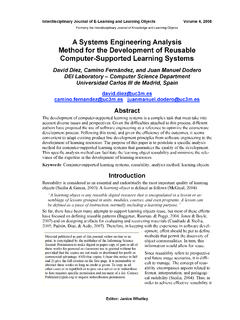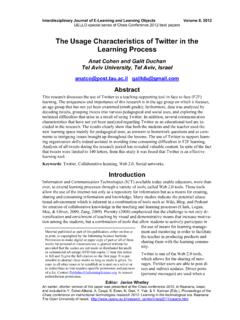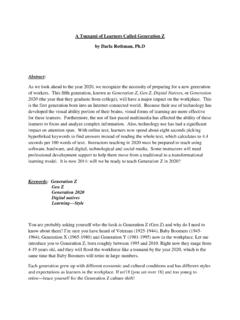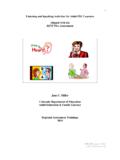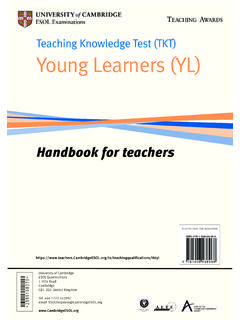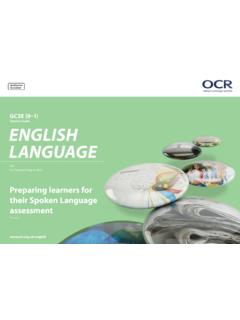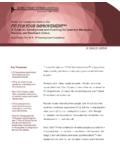Transcription of Why Learners Choose Plagiarism: A Review of Literature
1 Interdisciplinary Journal of E-Learning and Learning Objects Volume 7, 2011 Why Learners Choose Plagiarism: A Review of Literature Deanna Klein Minot State University, Minot, North Dakota, USA Abstract Through a Review of Literature , this paper presents a theoretical foundation for understanding why Learners may Choose to plagiarize both online and on ground. Ethical theories, social desirability, perceptions of plagiarism, and demographics and academic dishonesty in relation to the reasons Learners Choose to plagiarize are presented. Web sites that encourage plagiarism and online tools that are available to detect plagiarism are discussed. Keywords: Plagiarism, ethical theory, social desirability, perceptions of plagiarism, demograph-ics, academic dishonesty, online plagiarism detection Introduction Many actions performed by Learners in higher education could be considered dishonest.
2 Central Connecticut State University (2004) reports actions such as falsifying data, presenting another s words or ideas as one s own, or cheating on assigned work as being dishonest. Godfrey and Waugh ( ) describe dishonest practices as copying from previous assignments or from books, inappropriate student collaboration on assignments, inappropriate assistance from relatives, inap-propriate reference to crib notes, cheating during exams, and lying to faculty when missing dead-lines. According to McCabe & Trevino (1993, 1997, 2002), learner cheating is becoming a campus norm, institutions of higher education are lacking an honor code and adequate penalties, and there is little chance that a learner will get caught due in part by lack of faculty support for aca-demic integrity policies.
3 McCabe supports these statements based on his involvement with many research studies on academic integrity. McCabe has studied learner self-reported academic dis-honesty involving 2,100 Learners surveyed in 1999, faculty self-reported academic dishonesty involving over 1,000 faculty members on 21 campuses in 1999, and the influence of honor codes on academic dishonesty in 1990, 1995, and 1999 involving over 12,000 Learners and 48 campuses (Center for Academic Integrity, ). As a result of these studies, McCabe reports one-third of the participating Learners admitted to serious test cheating and half admitted to one or more in-stances of serious cheating on written assignments. One-third of the faculty reported that they were aware of learner cheating in their course in the last two years, but did nothing to address it (Cen-ter for Academic Integrity, ).
4 In ref-erence to reported faculty s cavalier atti-tude on cheating, McCabe finds, as sug-gested by learner reporting, that the en-gagement of cheating is higher in cours-es where Learners know faculty members Material published as part of this publication, either on-line or in print, is copyrighted by the Informing Science Institute. Permission to make digital or paper copy of part or all of these works for personal or classroom use is granted without fee provided that the copies are not made or distributed for profit or commercial advantage AND that copies 1) bear this notice in full and 2) give the full citation on the first page. It is per-missible to abstract these works so long as credit is given. To copy in all other cases or to republish or to post on a server or to redistribute to lists requires specific permission and payment of a fee.
5 Contact to request redistribution permission. Editor: Mark Stansfield Why Learners Choose Plagiarism are likely to ignore cheating (Center for Academic Integrity, ). McCabe & Treveno (2002) argue that Academic honor codes effectively reduce cheating. Surveys administered by McCabe demonstrate a positive impact of honor codes and learner involvement on academic dishonesty. Serious test cheating on campuses with honor codes is typically 1/3 to 1/2 lower than the level on campuses that do not have honor codes. The level of serious cheating on written assignments is 1/4 to 1/3 lower (Center for Academic Integrity, ). Researchers believe that the act of plagiarism is growing in higher education (Anderson, 2001; Ashworth, Bannister, & Thorne, 1997; Braumoeller, & Gaines, 2001; Bushweller, 1999; Center for Academic Integrity, 2001; Fain & Bates, 2002; Groark, Oblinger, & Choa, 2001).
6 The advent of the Internet has made a wealth of information available for Learners to research for writing pa-pers (Weinstein & Dobkin, 2002). Some Learners are using the availability of information via the Internet to improve the quality of their work; however, others are using it to simply cut and paste information into the paper. Because there is such a range of information that is relatively easy to access, Learners can easily plagiarize the work of others. McKenzie (1999) reports on teachers complaining that new technology is making it easier for Learners to plagiarize. Under the new plagiarism, as McKenzie refers to plagiarism using technology, Learners are now able to access and save numerous documents with little reading, effort, or originality as opposed to the huge amount of time it took for Learners to move words from an encyclopedia to white paper and changing a few words in an effort to avoid plagiarism.
7 The purpose of this paper is to provide a theoretical foundation for understanding why Learners may Choose to plagiarize. This paper is organized as follows. The paper presents a Review of lit-erature that includes ethical theory, social desirability, perceptions of plagiarism, and demograph-ics and academic dishonesty linking them to the reasons Learners Choose to plagiarize. The paper concludes with a discussion on Web sites that encourage plagiarism and online tools that are available to detect plagiarism. Ethical Theory Morality and Ethics McShane and Von Glinow (2005) describe ethics as the study of moral values involving actions that may be right or wrong or result in good or bad outcomes. Sullivan and Pecorino (2002) fur-ther classify ethics by ethical theory and ethical principle.
8 They suggest that ethical theory takes the most general point of view when interpreting ethical experience, obligations, or the role of reason. Ethical principles, on the other hand, are general rules of conduct that emerge or are de-rived from ethical theory. When discussing ethical principles, one should consider moral intensity and the ethical sensitivity as well (McShane & Von Glinow, 2005). Moral intensity measures the degree to which the application of ethical principal is necessary. When the intensity of a moral issue increases, a higher degree of ethical consideration is necessary. Ethical sensitivity deals with a personal characteristic. The more ethically sensitive a person is, the better he/she is able to recognize the presence and importance of an ethical issue.
9 According to Lyons (2005), many Americans are finding the moral and ethical climate to be trou-bling. According to Gallup s annual Mood of the Nation poll, as taken in 2005, 59% of Ameri-cans are somewhat or very dissatisfied with the ethical and moral climate of the country (Lyons, 2005). Only 7% of the remaining 40% are very satisfied with the ethical and moral climate of the country, and 33% are somewhat satisfied. Follow up interviews with some of the respondents resulted in diverse reasons for the responses. However, it should be noted that one of the concerns listed was plagiarism in the schools. The Gallup Poll also reports that the younger the respondent, those aged 18 to 29, the more satisfied with the ethical and moral climate of the country. 98 Klein Sullivan and Pecorino (2002) consider morality to be a social phenomenon because moral behav-ior is based on situations in which humans are living with others.
10 For example, inappropriate use of another s work is legally wrong in the United States and considered to be morally wrong by many people in the country. However, China doesn t have such a law, and plagiarism doesn t have the moral affect on Chinese Learners studying in their country. Cultural Relativism Cultural values have an important influence on personal ethical behavior (McShane & Von Gli-now, 2005). For example, when referring to an institution of higher education, one would think the cultural environment is pretty stable and is usually understood by Learners at some point. When the structure of the institution is further broken down, the culture within the major is even more obvious to the learner. However, Ashworth, Freewood, and Macdonald (2003) imply that this is a time of considerable change in higher education, and the changes effect the concern for increased plagiarism.

